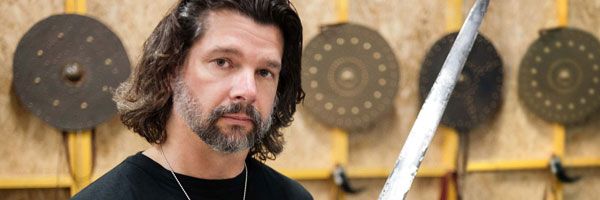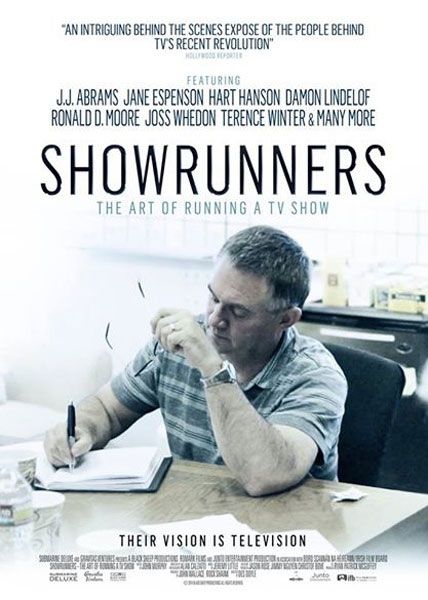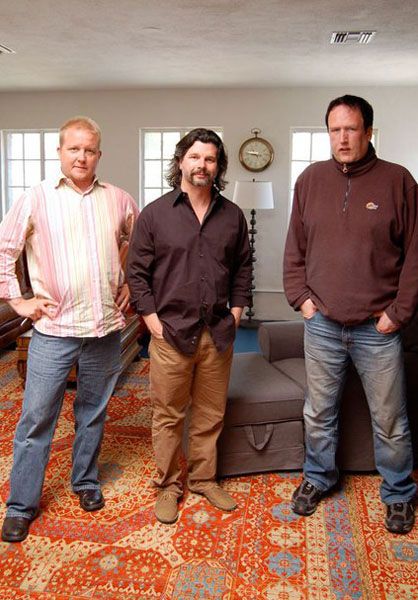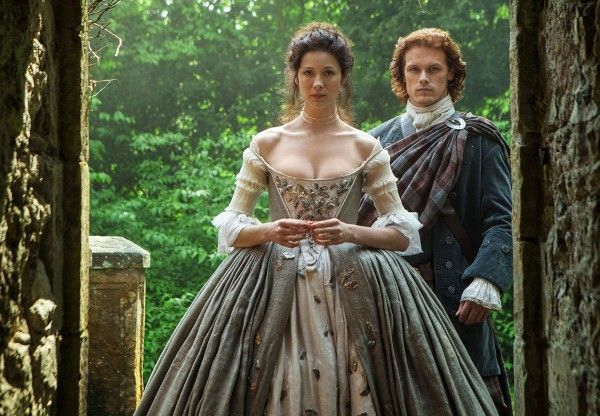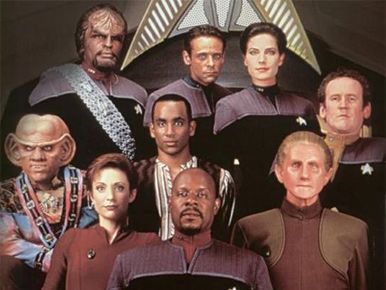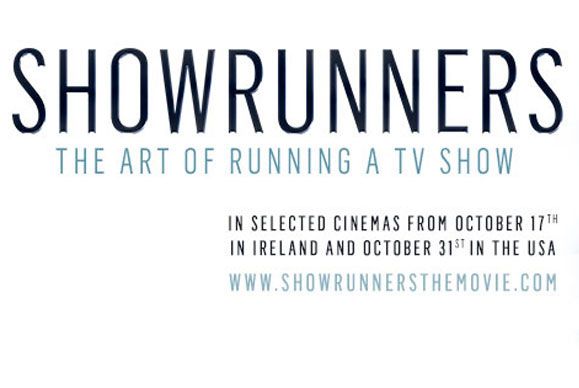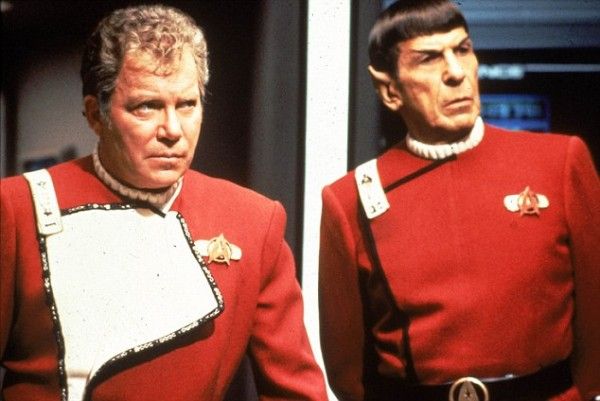Showrunners: The Art of Running a TV Show is a documentary that explores the role of the person or persons responsible for overseeing all areas of writing and production on a television series and ensuring that each episode is delivered on time and on budget for both the network that airs the show and the studio that produces it. In this perceived Golden Age of television, shows are now enthralling audiences the world over in the way that Hollywood feature films once did, and there is an increasing curiosity about the individuals that make that possible. The film features J.J. Abrams, Hart Hanson, Damon Lindelof, Ronald D. Moore, Joss Whedon, Terence Winter and J.H. Wyman, among others.
During this exclusive phone interview with Collider, Ronald D. Moore (who is currently the showrunner on the hit Starz drama series Outlander) talked about what made him want to become a showrunner, marrying the business side with the creative side, the funniest network experience he had over a script, when script notes can be most effective, knowing when to walk away from something that just isn’t working, getting the job writing for Star Trek, and the strange experience of killing off his childhood hero. He also talked about how many Outlander episodes are typically in some stage of development at the same time, how the demands of Outlander compare to the shows he’s done in the past, what he learned about the show while doing Season 1 that he will apply to Season 2, and just how much attention he pays to what’s being said on the fan sites. Check out what he had to say after the jump.
Collider: Was there a point along your career path that you realized what a showrunner is and what they do, and that you wanted to be one, or did you become one before you realized exactly what that meant?
RONALD D. MOORE: I think I had a pretty early idea of it. I grew up as a fan of the original Star Trek series. When I was in middle school, I think in the 6th grade, I remember going to a book fair and finding a book called The Making of Star Trek, by Stephen Whitfield, and I grabbed it and took and home and just devoured it, over and over again. It was a really influential book. It was very nuts and bolts. It was all about how Gene [Roddenberry] put together the original series. They didn’t have that term, in those days, but he was the showrunner. He didn’t really have a room of writers, per se. They freelanced their scripts. But other than that, the job was the same. Gene was in charge of the whole thing. He pitched the show, created it, developed it, ran the production, oversaw the cuts in post-production, and ultimately delivered it to the studio. So, I had an idea of what that position was, even as a kid. When I finally got my break in TV, as a staff writer, I always wanted to be at the top of that pyramid. I always wanted to make the decisions. I always wanted to be the one that was saying, “This is what the show is, and this is what the show is not. This is where we’re going. It’s going to be this kind of series.” It was just something I always had my eye on, when I started in the business.
Being a showrunner is all-consuming. How often do you love it, and how often do you wish you could go on vacation from it?
MOORE: I’m always looking for vacation. I’m always trying to step away from it to watch movies. I’m always trying to carve out free time for myself. But, I love it. I don’t think I’ve ever not wanted to run a show. When I have a show, I’m always really excited. I always enjoy the process. As frustrating as it gets, at times, and as frustrating as it is, at times, I don’t think I’ve ever considered doing something else, or not wanted to do it anymore. To me, it’s just the greatest job. It’s a good fit for who I am and what I want to be.
Being a showrunner is a job that marries the administrative and business side with the creative side, when most jobs really focus on one or the other. How difficult do you find that to juggle?
MOORE: If you ask me what I do, I would answer back that I’m a writer. That’s who I am, at my core. I’m a writer, and then I learned production and administration, along the way. I feel like most people can learn it because production and the administration part is all about logic, and it’s all about learning rules and budgets. The creative part, with the writing of it and the vision, and finding the voice of a show and the characters, is much harder to teach somebody. It’s like music. You can either play it or you can’t. If you can’t play music and you really struggle and work hard, you can learn, but you have to have some inner gift to take it to the next level. Writing is like that. You have to have some basic creative spark, and then, if you have that, I feel like you can learn the production side of it. You can learn how to be a good producer. And I guess it does take a certain balance of those two skills in your head to be a successful showrunner.
What is the dumbest or the funniest note you’ve ever gotten on a script?
MOORE: There was once I remember turning in a script on a Friday and sending it to the network. And then, on Monday, I had a conversation with the network on something else. I asked, “Hey, did you get a chance to read the script that was sent to you on Friday?” And the person on the other end of the line said, “Yes, I have.” I said, “What did you think of it?” And he said, “Well, we haven’t had our meeting about it yet, so I don’t really know what I think.” I thought, “Is he joking? Did he really just say that?” They were going to have a committee meeting because they didn’t really know what they thought until they had that meeting. I was a bit taken aback by that.
Was there ever a time that you got a note that was most effective for you?
MOORE: That’s a hard one to put my finger on. There are definitely times when the outside eye can shine a light on something you weren’t aware of. They’re usually exposing a flaw or a problem. Sometimes they’re saying, “Hey, this doesn’t really work. Have you seen this?” And then, you go, “Oh, I didn’t really see that. You’re right, that doesn’t work.” If they’re good, they shine a light on issues that you’re blind to because you’re too close to it. The difficult notes are when they say, “And this is how we want you to fix it . . .” Just tell me what the problem is. Just tell me what the issue is, and I’ll go off an fix it. It’s usually when executives get to a place where they’re trying to fix the problem for you that you have issues.
When you’re running a TV show, you have multiple episodes going in various stages. With Outlander, how many episodes do you tend to have in various stages of production, at any one time?
MOORE: It really varies, during the year. There was a point, during the summer, where I was literally working on all 16 episodes. I had delivered the first two episodes, but I needed to go back into them and make some additional cuts for international delivery. And then, there were five or eight episodes after that, that had been filmed and were still being edited, or music was being done, or the sound mix was incomplete, or we hadn’t added the visual effects. And then, there were shows that were still in preparation to be shot. And then, there were shows that were shooting. And then, there were shows that we were still writing. So, there was a period of a couple of weeks in the summer where I was working on all 16. But that’s the worst that it ever gets, when you’re literally juggling the entire season. Most of the time, you’re dealing with four to seven episodes, simultaneously. It’s all the ones that you’ve shot, the ones that you’re about to shoot, the one that’s shooting, and then the ones that are getting ready to shoot, so there’s always a range between four to seven.
How would you say the demands of Outlander compare to other shows that you’ve done, in the past?
MOORE: Well, it’s unique in my experience, in that we’re shooting in Scotland, and the writers’ room is in L.A. and post is in L.A. When we’re shooting, I commute to the UK, every three weeks or so, and that’s hard. That’s probably the toughest, physically, on me. It’s a much longer commute than I’ve ever had to deal with. And then, there are the challenges of this particular production. It’s not the kind of show that has standing sets. And your typical TV series, you’ve got your police station, your apartment, the hospital, the starship, or whatever it is, and you’re constantly going back to those sets and shooting, which saves you a lot of money and time. You can do that faster because you become really familiar with it and you become really good at it. And Outlander is a traveling show, so you’re constantly having to create new environments, new sets and new locations. With every episode, you just keep moving forward. So, instead of doing an ongoing series where you’re producing the same show and getting familiar with doing the same rhythm of work, over and over again, we’re almost doing 16 little mini-movies, and that’s hard. That takes a lot of time because you’re constantly having to scout, you’re constantly building, you’re constantly casting, and you’re constantly starting over the next week.
Well, congratulations on that because the show looks absolutely beautiful.
MOORE: Thank you. It’s a gorgeous show. It’s a gorgeous country. We have great DPs. It’s an amazing team. It’s a UK-based crew and staff, and they do amazing work. We have a tremendous cast. I’m really fortunate that I’ve been a part of really great shows. It’s been a really great thing to be a part of Battlestar Galactica. It was great to be a part of Star Trek. It’s great to be a part of Outlander. It’s just bigger than all of us, and you feel lucky.
The first season of Outlander is split in two, and you ended the first half on a cliffhanger. Was there much discussion about where you could leave that first half to keep people waiting in anticipation of the second half, but not have them be too angry that they don’t want to tune back in? Was it your decision where to leave it, or did the network also weigh in on that?
MOORE: I pitched it that way, pretty early on. Because we’re going from a book, that moment of Claire being held by Jack, and Jamie appearing in the window, as soon as I read it on the page, I was like, “Well, that’s a great cliffhanger,” and it happened to fall about mid-way through the book. It was a natural point. So, when we were putting the season together, I said, “Okay, in Episode 8, let’s say that that’s the cliffhanger,” and the network agreed. It was a done deal. It seemed obvious to all of us that that was the best. It literally was a cliffhanger moment and a good place to stop.
The wedding episode was such an intimate and very sexual episode. Did you have to do much negotiation on that, to push it as far as you did, or was that surprisingly smooth, as far as what you were able to do?
MOORE: There was no real issue with the network, whatsoever. Starz is a premium cable network and they pride themselves on pushing boundaries. They just said, “Go as far as you want to go. We’re not afraid of it. We want it to just work.” I just took the approach, with the director and the writer and the actors, and said, “Okay, this will be graphic, but I want it to feel authentic. I don’t want to do typical TV nonsense where you’ve got the big drape and the candle, and it’s soft-core porn. I want this to feel like two people having sex for the first time, in these circumstances. The first time they have sex, it ain’t gonna go so well. And the second time, it can be more charged. And then, it’s going to move to something more intimate.” I wanted a sense of truth to it, and I just kept emphasizing that we were going for reality. We weren’t going for romantic. I wanted it to feel real, and they delivered on that. It was a pleasure to cut the show and to mix it. I could watch the footage and go, “Yeah, this is good. This isn’t just prurient. It’s not just trying to put naked people on the screen. It’s actually about something. Each of these moments that we were having actors take their clothes off, has meaning to it. It actually does drive the story forward. It really is important to show this.”
Have you learned anything about the show, while writing it, that you didn’t realize before and that you want to apply to Season 2?
MOORE: Yeah. After you get a season under your belt, you learn a lot of lessons. It’s a much bigger challenge, logistically, in terms of production, than I think we anticipated, going into Season 1. We had to build a lot more than we anticipated, in terms of interiors. There were a lot of lessons of production to be learned. On the page, the biggest thing you learn on any TV show is how to write to your cast. You write the show at the beginning with certain voices in your head and you have a way that you think the characters will be, and then you have an actor go out there, and you start watching dailies and episodes. Then, you start realizing what they can do and what they can’t do, what they’re good at and what they’re not so good at, how they say things and what fits in their mouth, and you start tailoring the voice of the show to your cast. So, when you get into the second season, then you’re really up to speed on that. You have a lot of confidence that we all understand who these characters are.
When you know that you’re working on something with a built-in fan base, do you read any fan sites to see what the fans are happy, sad or mad about?
MOORE: Yeah, when episodes come on, I always do a quick pass through various fan sites and blogs and reviewers, to gauge and see what people are generally saying, but that’s about as far as it goes. I learned this lesson back at Star Trek, when the internet was still in its infancy, in a lot of ways. You quickly start realizing that you can get lost in it. No matter what it is, it’s still a tiny fraction of the audience because how many of us take the time to write about a TV show online, unless that’s your job. So, it’s already a fairly small fraction of the fan base that cares enough to write about it. They’re the most passionate and they pay the most attention to the show, but they’re also a fraction of the larger audience that’s watching it, week to week, so you can’t go completely by what the fans say. Also, their perspective is their perspective. It’s not a democracy. We just can’t open it up for a vote. You have to trust your own creative instincts and the story that you’re trying to tell, and hope that you get a positive reaction. So, I always look at the fan sites and I’m always interested in what they say, but it’s usually in terms of, “Wow, I hope they like this,” rather than, “Okay, I want to see what they’re after and change the show to tailor the message more for them, or to steer away from things they don’t like.”
When you have an experience like the one you had with the TV adaptation of the Pern books, how do you not let something like that discourage you? Do you have a point where you draw the line and decide to throw in the towel and walk away from something that clearly isn’t working?
MOORE: Yeah, you have to. I think the Pern experience was very important for me because it told me that, as bad as I wanted to do something, there was a point that I would walk away, and I carry that with me. It gives you a sense of confidence. Now I know that if I’m in a fight or a big argument with executives or the studio or whoever, and it’s getting to a point where it’s starting to get bad, I don’t have to have the fear of, “Am I strong enough to see this through? Would I really make a stand here? Would I really quit over this issue?” And I know in my heart that there is a place where I would walk away. I don’t have to make it about my ego. I don’t have to make it about whether I’m being strong enough or tough enough. I just feel like, “All right, I’ve done that. I’ve proven my point.” I can walk away, at a certain point, when things get out of hand, and I don’t have to worry about that.
This documentary talks about how the first season of a show belongs to the showrunner, the second season is a collaboration between the showrunner and the actors, and by the third season, it belongs to the actors because, if it came down to it, they’d get rid of the showrunner before they’d ever get rid of the stars of the show. Have you found that to be true?
MOORE: I remember when they said that, and that hasn’t really been my experience. I was a little taken aback. I haven’t been on that show. I guess it depends on what the show is. If you’re on a show like Everybody Loves Raymond, they’re certainly not gonna get rid of Raymond. I think it depends on what the series is and how you’re viewed. Maybe it’s also that I’ve never run into that situation where I had a cast that was rising up, and I was in a battle with my cast. My experience, from the beginning, since Star Trek and all the way up until now, I’ve loved my casts. They’ve been part of the family and we’ve just worked really well together, so I never really thought about it, in terms of them versus me.
When you wrote that spec script for Star Trek, did you have any expectation for what might happen, as a result? Could you ever have imagined that it would turn into a job, so quickly?
MOORE: The truthful, immodest answer is that I absolutely believed that it would. Looking back on it now, I’m like, “God, you were just full of hubris. What the hell was wrong with you?!” But at the time, I totally believed it. I was like, “I’m gonna sell this, they’re gonna make it, and they’re gonna bring me on this show.” I remember walking through the building where all the writers were at Paramount while I was on the tour, and we walked by this tiny little office. It was literally the size of a closet, next to the stairwell. As we passed by that office, Richard Arnold, who was giving me the set tour and was instrumental to that whole story, he said, “One of the writers used to work in there, and they just left.” I remember looking in that office and going, “I’m gonna be in that office someday.” And you know what? I was. But, it’s hard to even tell that story because it’s so ridiculously arrogant for a 23-year-old. That was the attitude I had. I completely believed that I was gonna sell it, it was gonna happen, and I was gonna do it. Some miracle of the gods actually decided to make it happen.
You’re one of the few or only people in the world who can say that they literally killed off their childhood hero. What was that experience like, when you were going through it?
MOORE: It was difficult, and yet I was very eager to do it. It was a really odd thing. I really wanted to do that story. I really wanted to write the death of Captain Kirk. I really wanted to do it in the movie. I remember writing the scene with Brannon [Braga], my writing partner, at the time. When I said, “And Kirk dies,” I wept. It was very emotional and very strange, in the moment and all the way through the process. I’d read it in the script and I’d always be struck by what I’d just done and what we were doing, and that this was my childhood hero and I was writing his death. Even then, I didn’t quite know what to make of it. I was mystified by why I was doing it, why I was so driven to do it, and why it was affecting me like it was. I still don’t know what it means. It’s a strange singular experience. I don’t even know anyone to talk to about it because I don’t know anyone who’s had that experience.
When you hear a statistic like the one in the film, that whether in success or failure, the burn-out rate for showrunners is 100%, does that worry you, at all? Are you concerned about getting to a position where you might get burned out like that, or do you love it as much now as you did when you started?
MOORE: I love it as much now, if not more, as when I started. When I heard that statistic in the film, I was taken aback. I was like, “I’ve never heard that before. Is that true?!” I’m hoping he just made that up. I would like to not think that that’s true.
Showrunners: The Art of Running a TV Show is now available in theaters and on VOD.

